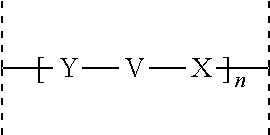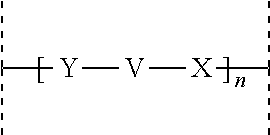Acylated glucagon analogues
a technology of acylated glucagon and analogues, which is applied in the field of acylated glucagon analogues, can solve the problems of obesity and life expectancy reduction, glp-1 on the other hand is not capable of activating glucagon receptors, etc., and achieves the effects of inhibiting or reducing, preventing weight gain, and promoting weight loss
- Summary
- Abstract
- Description
- Claims
- Application Information
AI Technical Summary
Benefits of technology
Problems solved by technology
Method used
Image
Examples
example 1
General Synthesis of Glucagon Analogues
[0293]Solid phase peptide synthesis (SPPS) was performed on a microwave assisted synthesizer using standard Fmoc strategy in NMP on a polystyrene resin (TentaGel S Ram). HATU was used as coupling reagent together with DIPEA as base. Piperidine (20% in NMP) was used for deprotection. Pseudoprolines: Fmoc-Phe-Thr(psiMe,Mepro)-OH and Fmoc-Asp-Ser(psiMe,Mepro)-OH (purchased from NovaBiochem) were used where applicable.
[0294]Abbreviations employed are as follows:[0295]Boc: tert-butyloxycarbonyl[0296]ivDde: 1-(4,4-dimethyl-2,6-dioxocyclohexylidene)3-methyl-butyl[0297]Dde: 1-(4,4-dimethyl-2,6-dioxocyclohexylidene)-ethyl[0298]DCM: dichloromethane[0299]DMF: N,N-dimethylformamide[0300]DIPEA: diisopropylethylamine[0301]EDT: 1,2-ethanedithiol[0302]EtOH: ethanol[0303]Et2O: diethyl ether[0304]HATU: N-[(dimethylamino)-1H-1,2,3-triazol[4,5-b]pyridine-1-ylmethylene]-N-methylmethanaminium hexafluorophosphate N-oxide[0305]MeCN: acetonitrile[0306]NMP: N-methylpyrr...
example 2
Glucagon Receptor and GLP-1-Receptor Efficacy Assays
[0329]The cDNA encoding either the human glucagon receptor (Glucagon-R) (primary accession number P47871) or the human glucagon-like peptide 1 receptor (GLP-1R) (primary accession number P43220) were synthesized and cloned into a mammalian expression vector containing a Zeocin resistance marker.
[0330]The mammalian expression vectors encoding the Glucagon-R or the GLP-1-R were transfected into Chinese hamster ovary (CHO) cells by the Attractene method. Stably expressing clones were obtained by Zeocin selection (250 μg / mL) upon limited dilution of cells resistant to the selection pressure. Glucagon-R and GLP-1-R cell clones expressing were picked, propagated and tested in the Glucagon-R and GLP-1-R efficacy assays as described below. One Glucagon-R expressing clone and one GLP-1-R expressing clone were chosen for compound profiling.
[0331]CHO cells expressing the human Glucagon-R, or human GLP-1-R were seeded 24 hours prior to the ass...
example 3
Agonistic Activity on Endogenous GLP-1 Receptor
[0332]Agonistic activity of the test compounds on endogenous GLP-1 receptors was determined using a murine insulinoma cell line. Intracellular cAMP was used an indicator of receptor activation.
[0333]Cells were cultured for 24 h at a density of 10,000 cells / well in a 384-well plate. Medium was removed and 10 μL KRBH buffer (NaCl 130 mM, KCl 3.6 mM, NaH2PO4 0.5 mM, MgSO4 0.5 mM, CaCl2 1.5 mM) containing test compound or GLP-1 (at increasing concentrations from 0.1 pM to 100 nM) or solvent control (0.1% (vv) DMSO) was added to the wells for 15 minutes at a temperature of 26° C.
[0334]The cellular cAMP content is measured using the AlphaScreen cAMP Functional Assay Kit (Perkin Elmer). Measurement was performed using the Envision (PerkinElmer) according to manufacturer's recommendations.
[0335]Results were converted into cAMP concentrations using a cAMP standard curve prepared in KRBH buffer containing 0.1% (vv) DMSO. The resulting cAMP curves...
PUM
| Property | Measurement | Unit |
|---|---|---|
| width | aaaaa | aaaaa |
| length | aaaaa | aaaaa |
| composition | aaaaa | aaaaa |
Abstract
Description
Claims
Application Information
 Login to View More
Login to View More - R&D
- Intellectual Property
- Life Sciences
- Materials
- Tech Scout
- Unparalleled Data Quality
- Higher Quality Content
- 60% Fewer Hallucinations
Browse by: Latest US Patents, China's latest patents, Technical Efficacy Thesaurus, Application Domain, Technology Topic, Popular Technical Reports.
© 2025 PatSnap. All rights reserved.Legal|Privacy policy|Modern Slavery Act Transparency Statement|Sitemap|About US| Contact US: help@patsnap.com



